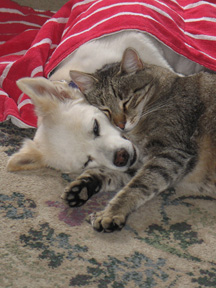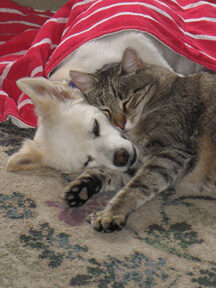Nighttime Waking in Senior Dogs
Sleep is essential for dogs and people. Disturbances of the sleep-wake cycle occur in older pets and often disrupt the entire family. Interrupted sleep is a common problem in older pets and may occur for many reasons, including both medical and anxiety-related causes.
Diagnosis and Clinical Signs

There are many reasons an older dog may have difficulty sleeping at night. Dogs do get cognitive dysfunction, which is similar to dementia in people. The hallmarks of these syndromes are progressive confusion, reversal of day-night wake-sleep patterns, and poor adaptability to new situations. Just like older people with early-stage dementia, the dog may function well in routine and familiar situations but be confused in new situations.
Waking at night may occur for reasons other than cognitive dysfunction, such as pain or discomfort. Dogs who are feeling discomfort may pace, pant, vocalize, or be restless at night but may not show any physical limitations during the day. The effects of pain or sore muscles may be more noticeable to the dog at night.
The urge to eliminate may wake many dogs. Senior pets are more likely to have medical conditions that would increase the pet’s urination or defecation frequency or decrease control of these bodily functions.
Many physical and medical conditions should be considered, including urinary tract infections, kidney disease, hormone imbalances, Cushing’s Syndrome, gastrointestinal (GI) upset, and neurological impairments.
Anxiety can cause nighttime waking. Dogs may be anxious because of weather-related noises such as thunderstorms or noises in the home from people or other animals. The dog may also be anxious during the day but the severity is often increased at night since these noises are more pronounced and start when it is quiet. Furthermore, the dog’s reaction may be limited to restlessness or pacing, which is often not noticed during the day. Seizures may occur anytime but often seizures that occur at night are not seen by the family, so people are awakened by a dog in a confused state.
Thinking about the pattern of when the dog wakes can help figure out the cause and at least partially correct the problem. Some dogs have difficulty settling down or falling asleep while other dogs may go to sleep easily and then wake up in the middle of the night. Some dogs go to sleep, enjoy slumber much of the night, and then wake up early. A definitive diagnosis may be difficult because there are so many medical conditions to consider. Cognitive dysfunction is only diagnosed with certainty in the later stages, and there is no test for it.
Management
After evaluating possible medical causes, try to establish a predictable routine for nighttime slumber. The pet’s routine as a younger dog may provide some insight into his preferences but consider age-related changes. An older dog may require an orthopedic bed to ease pressure on bones and joints. Warmth may also be important as the dog may not be able to regulate body temperature and cold weather may affect sensitive joints. Establish a bedtime routine that may include a late trip outside for elimination, a massage, and quiet time settling in a comfortable area. Most dogs prefer to be with family members but some prefer to rest alone. Quiet, soothing music may obscure sounds and a night light may help a dog with vision problems to walk in dark hallways with more ease.
Even though this condition may be frustrating, avoid punishing or scolding. After addressing your dog’s physical needs, try gently and calmly returning your dog to where he likes to sleep. Some dogs want to sleep in bed with people; this is a matter of personal preference and family tolerance. Unless it is unsafe due to aggression, it is acceptable for dogs to sleep with people. Be sure to consider if this pattern of slumber with canine companions will continue to be acceptable since once they have tried it, many dogs like to sleep on comfortable mattresses with comforters. Despite commonly perpetuated myths, this type of “spoiling” does not cause other behavior problems; it does, however, teach a dog it is nice to sleep in a person’s bed.
Nutraceutical and Pheromone Interventions
Cognitive dysfunction is a slow, degenerative, and progressive disorder. Supplements are available that may ease the severity and slow its course. Ask your veterinarian about diets designed for the unique needs of senior pets. Some of them provide antioxidants (vitamins C and E, beta carotene, selenium, flavonoids, and carotenoids) that may reduce the neurological damage caused by free radicals and fatty acids as well as dl-alpha-lipoic diet and l-carnitine. Others include botanic oils such as medium chain triglycerides (MCT’s) that provide an alternative energy source. These diets are shown to improve a senior dog’s performance on cognition tests.
Dietary supplements that contain phosphatidyl serine, ginkgo biloba, and grape extract (resveratrol) are likely to slow and minimize cognitive impairment. S-adenosyl-l-methionine, or SAMe, may reduce anxiety and increase awareness and activity in the senior dog. Furthermore, SAMe is safe or even beneficial for patients with compromised liver function. These supplements are most beneficial in the early stages of cognitive decline.
A dog-appeasing pheromone (such as Adaptil) may ease anxiety and promote a feeling of well-being. The diffuser may be especially useful to create an area and support the use of a desired area for resting. The collar is most useful for dogs who experience anxiety all the time.
Melatonin may help create a normal nighttime sleeping cycle. This supplement should be given at bedtime on a regular basis. Combined with a predictable nighttime routine, it can help create a normal sleep pattern.
Pharmacological Treatments
Sometimes medications may be helpful to induce sleep. Benzodiazepines (anti-anxiety medications) such as diazepam (Valium), alprazolam (Xanax), or oxazepam (Serax). Trazodone may also be helpful. These medications are relatively quick-acting but don’t last long so administration must be timed carefully. Medication should be combined with other recommendations described above.
Generalized anxiety may be reduced with medications such as SSRI’s or TCA’s but these medications require many weeks before positive effects are seen. Cognitive dysfunction symptoms may be reduced with selegiline (Anipryl), which when given in the morning may help to keep the dog more alert and active during the daytime. Old age onset of anxiety may reflect the additive effect of lifelong learning or be a sign of progressive decline from cognitive dysfunction.
Expected Outcome
Nighttime waking may be caused by medical or behavioral changes common in senior dogs. Often these problems may be managed and good sleeping patterns can be re-established, though many of the underlying conditions may be persistent and worsen with age. Quick intervention is important since undesirable habits may form quickly and people may become frustrated when they’re sleep deprived.
